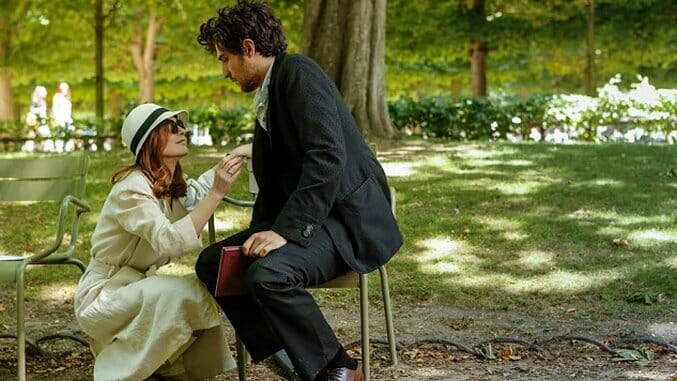
Isabelle Huppert walks on screen in Luc Bondy’s False Confessions intent, it seems, on reminding audiences that she can do anything, including turn a modern adaptation of outdated theater tropes into near-vital product. Granted, if you saw her in Paul Verhoeven’s Elle last year, or Mia Hansen-Løve’s Things to Come, or perhaps Joachim Trier’s Louder Than Bombs, you don’t need reminding of Huppert’s eminence, because there aren’t many actors who could contribute three high-quality performances to as many movies in a single year, without repeating themselves or stumbling through their craft. Really, if you’ve seen literally any Huppert film, you already know what she’s capable of. Affirmations need not apply.
Still, there’s a staleness lingering at the edges of False Confessions, and Huppert, with little more than an offhand gesture or a girlish smile, is so proficient in becoming her characters that she almost freshens its material all on her own. Watching Huppert at work is a distinct pleasure: Her every move reads equally as effortless and calculated, practiced without striking as affected. She doesn’t so much as act, as she inhabits the stage. In the interest of according her co-stars due credit for their contributions to Bondy’s filmed play—and it very much is a filmed play, even if that isn’t made explicit until its final moment—Huppert has the luxury of being backed up by a gifted primary and supporting cast. But if we’re being honest she steals their spotlight, or rather she is the spotlight.
Huppert plays Araminte, a wealthy widow in need of a good accountant to help her review a case she’s pushing against Comte Dorimont (Jean-Pierre Malo), who thinks he can put a stop to legal proceedings by asking for her hand. So Araminte calls on the young and ridiculously handsome Dorante (Louis Garrel) for assistance, unaware that Dorante happens to be in cahoots with her valet, Dubois (Yves Jacques); Dubois knows Dorante has a major crush on Araminte, and so schemes to marry them in the name of love and also profit. The Dubois-Dorante ploy provides False Confessions with its structure, buttressed by assorted lies, half-truths, chicanery, backstabs, gossip, and every other flavor of well-meaning mendacity, except it’s 2017 and maybe cheeky male stratagems for hoodwinking women into getting hitched are kinda gauche.
This is a pretty standard outline for comedies in theater, one well-tread by Shakespeare and also by the French dramaturge Marivaux, whose 1737 play Les Fausses Confidences supplies Bondy with his blueprint. In his hands, False Confessions is an agile tale of deceit and crossed signals that flirts with regression by today’s standards. It isn’t a problem that stories like this exist. Nor is it a problem that we’re still telling them, even as our social and cultural politics progress, and with Huppert in the frame, it’s even less of a problem: She’s preternaturally skilled at turning dramas that appear atavistic at a glance into artistic statements. (Again: You should see Elle.) She fools us, as Dorante and Dubois fool Araminte, into believing that she has the upper hand, that she’s in full possession of her agency, that these vain, dishonest men only think they’re pulling one over on her.
But of course none of these are the case. Araminte gets played. She gets duped. Bondy keeps False Confessions light on its feet, and that adopted tone offsets the more unflattering truths comprising its plot. Deprived of gravity, the constant stream of duplicities feel less like a burden, less like a dilemma to the viewer, and more like a source of innocuous comedy. It’s hard to imagine that Bondy means ill by leaning into that tried-and-true device of marriage-by-guile; he’s simply mimicking what storytellers of bygone times have used to such great effect that their works are still a mainstay of high school English curriculums. What prickles us is that he does so little to tweak the formula, other than to transplant Marivaux’s original farce to a contemporary backdrop. (If memory serves, Araminte is described as a young woman in the Marivaux text, but Huppert is eternal, so this particular detail feels irrelevant.)
Picking on Bondy for letting that formula stand feels like a faux pas; False Confessions is being billed as his final feature prior to his passing in 2015, and there’s nothing satisfying about bagging on a deceased man’s parting shot. But there’s no harm in looking for more, and this film could have easily been more than it is: Handsomely shot, though at times puzzling blocked, and sharply acted, with little new to say and even less to add to its source material.
Director: Luc Bondy
Writer: Luc Bondy, Geoffrey Layton (script); Marivaux (play)
Starring: Isabelle Huppert, Louis Garrel, Yves Jacques, Jean-Pierre Malo, Manon Combes, Bulle Ogier, Bernard Verley, Fred Ulysse
Release Date: July 14, 2017
Boston-based critic Andy Crump has been writing about film and television online since 2009, and has been contributing to Paste Magazine since 2013. He writes additional words for The Playlist, Slant Magazine, and Birth. Movies. Death., and is a member of the Online Film Critics Society and the Boston Online Film Critics Association. You can follow him on Twitter and find his collected writing at his personal blog. He is composed of roughly 65% craft beer.